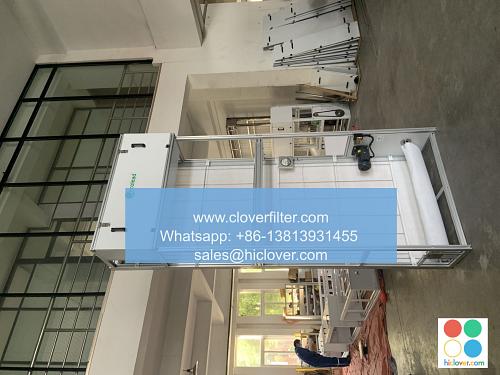Automatic Roll Air Filters: A Key Component in Maintaining Optimal Electronics Manufacturing Conditions

Electronics manufacturing environments require precise control over temperature, humidity, and air quality to ensure the production of high-quality products. One crucial component in maintaining optimal conditions is the automatic roll air filter. These filters play a vital role in removing airborne contaminants, such as dust, particles, and moisture, that can damage sensitive electronics and compromise the manufacturing process.
Automatic roll air filters are designed to provide a continuous supply of clean air, minimizing the risk of contamination and ensuring a stable environment for electronics production. They work by drawing in air through a series of filters, which capture particles and other impurities, and then releasing clean air back into the environment. The filters are typically made of a pleated material, which allows for maximum surface area and efficient airflow.
The benefits of using automatic roll air filters in electronics manufacturing are numerous. For one, they help to prevent damage to sensitive components and equipment, which can be costly to repair or replace. They also reduce the risk of product defects, which can result in significant losses and damage to a company’s reputation. Additionally, automatic roll air filters can help to improve worker health and safety by removing airborne contaminants that can cause respiratory problems and other health issues.
In addition to their practical benefits, automatic roll air filters also offer a number of economic advantages. They can help to reduce energy costs by minimizing the need for heating and cooling, and they can also extend the lifespan of equipment and components. Furthermore, automatic roll air filters can help to improve productivity by creating a stable and reliable environment for electronics production.
There are several types of automatic roll air filters available, each with its own unique characteristics and benefits. Some common types include pre-filters, which capture larger particles and debris; HEPA filters, which capture 99.97% of particles as small as 0.3 microns; and activated carbon filters, which capture gases and odors. The choice of filter will depend on the specific needs of the manufacturing environment and the types of contaminants that need to be removed.
When selecting an automatic roll air filter, there are several factors to consider. One important consideration is the filter’s efficiency and effectiveness in removing airborne contaminants. Another factor is the filter’s airflow rate, which will depend on the size of the manufacturing environment and the amount of air that needs to be filtered. Additionally, the filter’s maintenance requirements and cost should be taken into account, as well as its compatibility with existing equipment and systems.
In terms of maintenance, automatic roll air filters are relatively easy to care for. They typically require periodic cleaning and replacement of the filter media, which can be done quickly and easily. Some filters also come with built-in monitoring systems, which can alert maintenance personnel when the filter needs to be replaced or cleaned.
Overall, automatic roll air filters are a crucial component in maintaining optimal electronics manufacturing conditions. They provide a reliable and efficient way to remove airborne contaminants, minimizing the risk of damage to sensitive components and equipment. By selecting the right filter for their specific needs and maintaining it properly, manufacturers can help to ensure a stable and productive environment for electronics production.
In conclusion, automatic roll air filters are a key component in electronics manufacturing, providing a reliable and efficient way to remove airborne contaminants and maintain optimal conditions. By understanding the benefits and types of automatic roll air filters, as well as the factors to consider when selecting and maintaining them, manufacturers can help to ensure a stable and productive environment for electronics production.
Conclusion
In summary, automatic roll air filters are a vital component in electronics manufacturing, providing a reliable and efficient way to remove airborne contaminants and maintain optimal conditions. Their benefits include preventing damage to sensitive components and equipment, reducing the risk of product defects, and improving worker health and safety. By selecting the right filter and maintaining it properly, manufacturers can help to ensure a stable and productive environment for electronics production.
FAQs
Q: What is an automatic roll air filter?
A: An automatic roll air filter is a type of air filter that provides a continuous supply of clean air by drawing in air through a series of filters, which capture particles and other impurities, and then releasing clean air back into the environment.
Q: What are the benefits of using automatic roll air filters in electronics manufacturing?
A: The benefits of using automatic roll air filters in electronics manufacturing include preventing damage to sensitive components and equipment, reducing the risk of product defects, and improving worker health and safety.
Q: What types of automatic roll air filters are available?
A: There are several types of automatic roll air filters available, including pre-filters, HEPA filters, and activated carbon filters.
Q: How do I select the right automatic roll air filter for my manufacturing environment?
A: When selecting an automatic roll air filter, consider the filter’s efficiency and effectiveness, airflow rate, maintenance requirements, and cost, as well as its compatibility with existing equipment and systems.

